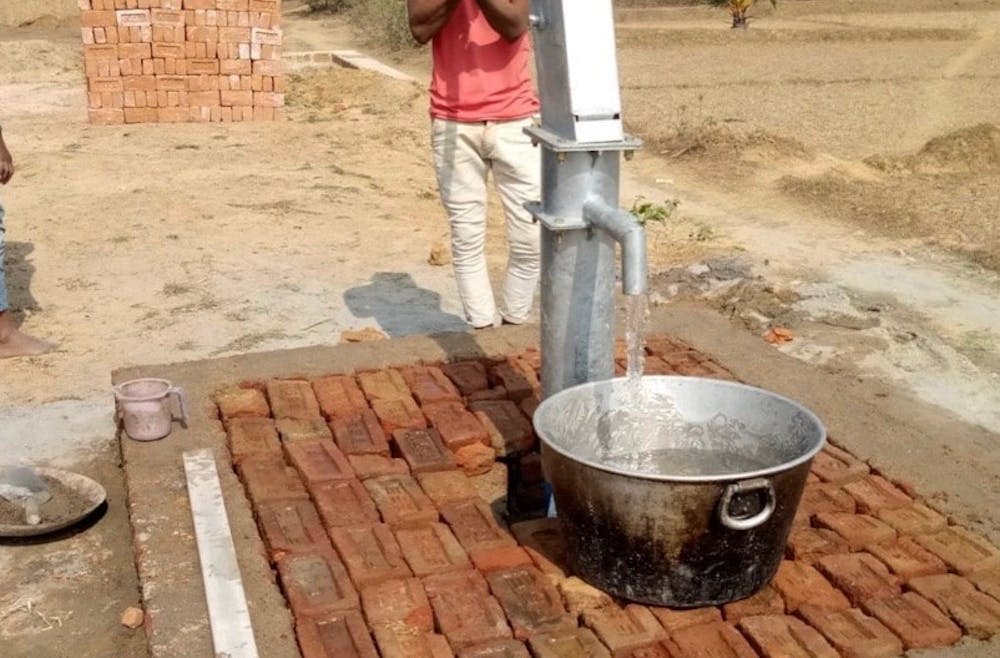HHI’s initial focus was improving sanitation by providing soap and cleaning supplies – hence the name “Healthy Hands.” After learning from Churiwal’s research and speaking with faculty, Im and Pruthi decided to go a step further and address the even more foundational issue of clean water, Im said.
First, HHI planned to provide portable water filters, but their approach transitioned to a more sustainable, long-term solution: installing and maintaining water hand pumps to provide the villagers with 24/7 year-long access to clean water.
HHI’s three committees, outreach, finance and media and external affairs, work together to fundraise, establish HHI’s donor base and publicize the projects. They’ve received financial support from the Robert E. Bryan Fellowship, Service Partnership Mini-Grants, The Kenan-Biddle Partnership, and the 1789 Student Venture Fund.
Churiwal is in charge of international communications with HHI’s community partner in India, Jan Chetna Manch, Bokaro.
Installing the hand pump
Prior to HHI’s installation of the new hand pump in Lalpur, the closest hand pump to the village was a half-mile away.
“Distance isn’t necessarily the issue,” Im said. “The issue is that these hand pumps seldom work.”
The hand pumps in these villages are meant to be maintained by the government, but they’re often broken and don’t work during the dry season, Im said. The hand pumps aren’t dug deep enough to reach the water, or contaminants leak into the water because the pump isn’t maintained.
HHI chose to install an Afridev hand pump because they are easy to repair and the community is already familiar with them. It was installed during the dry season so the pump reaches the lowest possible water depth – about 200 feet – underground. The casing around the pumps prevents leakage and contaminants from getting into the water. JCMD will maintain the pump to ensure the community has reliable and sustainable access to clean water.
To use the pump, villagers pull down a seesaw-like lever that releases a steady stream of water from the spigot. The new pump benefits 60 families – around 250 people in Bokaro – and marks an imperative starting point in combating water insecurity and its health implications.
One of the most memorable moments was when the team saw photos and video clips from JCMD, Zahabioun said. When he saw the smile of a local Bokaro mother using the pump, it made his day.
“This is our whole purpose,” Zahabioun said. “To be able to help those individuals who are in desperate need of clean water. Visualizing how they felt after receiving the hand pump was extremely rewarding.”
To get the day's news and headlines in your inbox each morning, sign up for our email newsletters.
An ongoing effort
HHI aims to expand hand pump installations to surrounding villages and continue its focus on improving public health in India. Each water pump costs $600 to install – the goal is to install three more by the end of the year.
To further understand how their project improves water security in the village of Lalpur, HHI is conducting a survey called the “Household Water Insecurity Experiences scale.”
“Even though we’re halfway around the world we’re still trying to be a friend to the village and to the people that we’re working with to create a solution that makes sense for everybody, ” Pruthi said.
They’ll continue collecting feedback to improve the project and create a streamlined sanitation approach that includes keeping water clean after it’s pumped. Additionally, they’ll consider what additional infrastructure they can provide, like installing a light post near the hand pump to make people feel safer at night while collecting water.
“I’m most proud of the fact that we were able to generate a vision that we all agreed on and understood and that we were able to really execute it,” Pruthi said. “And that we have plans to go farther with it.”
To learn more about the Healthy Hands Initiative, you can visit its website or Instagram.
@_AnneTate_
university@dailytarheel.com



